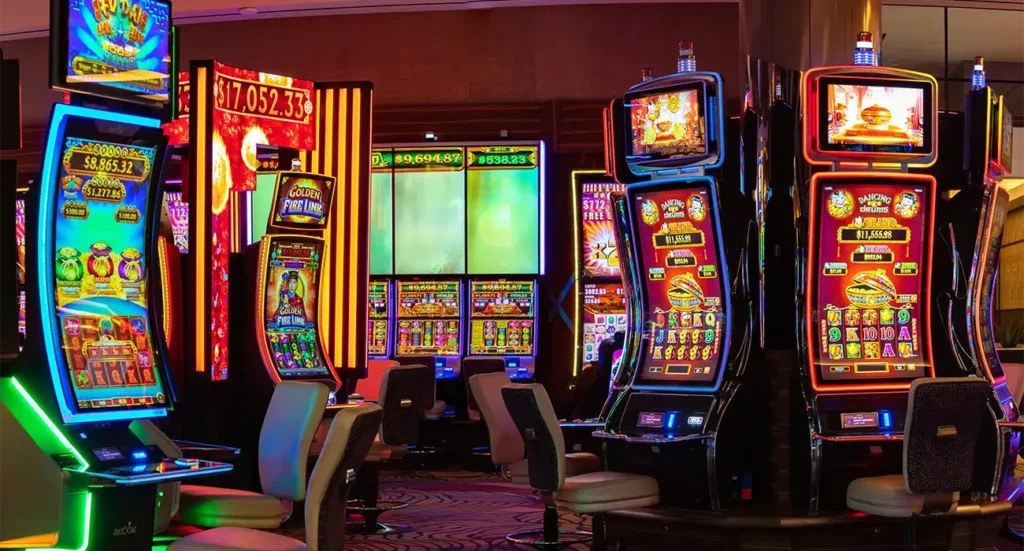A lot of nonsense is spread about slot machines in casinos. Adepositcasino debunks five misconceptions and tells you how slot machines actually work.
1. ‘A slot machine that hasn’t paid out in a long time is getting “hotter” when it comes to paying out.’
No. Whether you win or not is determined by the computer in the slot machine, the so-called Random Number Generator (RNG). This RNG completely randomly determines whether a prize is awarded and, if so, which prize every time you press the start button (or pull the lever).
What happened in the previous spin, or the spins before that, has no influence whatsoever on the outcome or your chance of winning. In this respect, a slot machine works the same as a roulette wheel – it has no memory either.
So it can ‘simply’ be the case that a slot machine pays out little for a long time. But that doesn’t mean the slot will suddenly start paying out more after that. And if you win a jackpot, the chance of the next spin being a jackpot again is exactly the same as during all other spins.
So: whether you win or not is a matter of luck with each spin. This applies to slots in legal online casinos in Canada as well as at land-based casino locations.

2. ‘You’re better off playing the lottery than throwing money into a slot machine.’
Not true. Especially not in Canada. The Lotto Max, let’s not even talk about that, with ‘free ice cream’ and a bunch of roses in their prize package. Adepositcasino can do that too.
Scratch cards aren’t really an option in Canada either, with an average chance of winning of about 1 in 4. If you win, in many cases you only get a free ticket. The payout percentage depends on the type of scratch card but ranges between 47.5% and 65%.
The Lotto pays out about 50% of the stakes in the form of prizes. Not very impressive either.
Then there’s the Lotto Max. About half of all tickets win a prize. Sounds good? No. Most prizes are smaller than the cost of a ticket. Only 1 in 10 tickets yields a prize equal to or higher than your own stake.
Government lotteries in Canada typically provide higher payouts, averaging around 54% of each dollar spent
Now let’s look at slot machines.
How much does a slot machine have to pay out? The law prescribes different minimum percentages, depending on where the slot machine is located:
- In a bar/restaurant: at least 60%
- In an arcade: at least 60%
Keep in mind, this is the legal minimum.
That’s already a lot better than those lotteries.
So on average, betting one euro on a slot machine yields much more than spending one euro on a lottery.
One side note from Adepositcasino: with a lottery, you might play once a week or a month with a few tickets. If you sit at a slot machine for an hour, you’ve likely already played hundreds of spins. Despite the higher payout percentage, a slot machine can therefore still cost more money if you’re unlucky.
3. ‘If you count the number of symbols on each reel, you can precisely calculate the odds of a particular prize.’
No. This is a common misconception. Let’s say a machine has three reels with 10 symbols per reel. In total, there are 10 x 10 x 10 = 1000 combinations. The jackpot symbol appears once on each reel. Many people then think the chance of hitting the jackpot must be 1 in 1000.
That’s incorrect. A long time ago, when slot machines were purely mechanical, that was the case. Each stop position of the reel had an equal chance of appearing on the payline back then.
Modern slot machines work differently. The computer has ‘virtual reels’ programmed in. These can have many more stop positions than you can see on the actual reels. For example, each reel could have 256 ‘virtual stop positions’.
Each stop position on the virtual reel corresponds to a symbol on the actual reel, but one symbol can be assigned many more virtual stop positions than another.
If the jackpot symbol only appears once on the virtual reel, the chance of hitting the jackpot is 1 in 256 x 256 x 256 = 16,777,216. Quite different from 1 in 1000.
So you can’t deduce the odds from the layout of the reels.
With an online slot, of course, it’s impossible.
4. ‘If you pull the lever on a slot machine, you win more on average than when you press the button.’
Not true. A one-armed bandit doesn’t inherently pay out better than a ‘regular’ slot machine with only a push button.
When you pull the lever, the exact same thing happens inside the slot machine as when you press the button. The sound you hear and the resistance you feel might make it seem as if you’re exerting force to set the reels in motion, but that’s nonsense.
You’re likely to lose less on a machine if you use the lever, though. Pulling the lever takes a bit longer than pressing a button. That’s the only reason your hourly loss will be slightly lower on average if you use the lever.
5. ‘Slot machines near the cashier of a casino pay out better.’
No. If you’re standing at the cashier in a casino, you’re either about to gamble or already playing. It makes no sense for casinos to place ‘looser’ slot machines there.
Some casinos prefer to put the highest-paying slots near the entrance of their casino to attract customers. Slot machines along busy walkways sometimes pay out better than fruit machines in quieter areas of the casino too. The idea is: that seeing people win makes you want to gamble.
